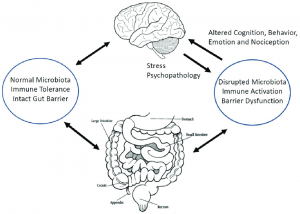
Do you feel nauseated when you are worried or anxious about something? Does your stomach act weird whenever you are stressed? So the question arises can anxiety cause nausea and loss of appetite?
If you are constantly worrying about something or the other and feeling nervous about many things in life, then probably you are anxious. Anxiety is the nervousness or feeling of something wrong or a knot in the stomach, it can be defined in many ways as per the patient’s experience.
Other than nausea and diarrhea, some other symptoms of anxiety are dizziness, loss of appetite, inability to breathe properly etc. The presence of nausea in an anxious patient is one of the most prevalent anxiety symptoms.
In this article, we will find out the anxiety symptoms, and can anxiety cause nausea and other digestive problems and how to treat it.
Can Anxiety Cause Nausea?
Yes, Anxiety can cause nausea and thereby the loss of appetite as well, as the person who is anxious is often overwhelmed by his/her mental situation. Not just in adults, nausea is associated with anxiety in children as well.
When nausea is dominating, the person can’t even think about eating something so the loss of appetite often follows. Such symptoms if they last longer, lead to many mineral deficiencies such as electrolyte imbalance, weakness, dehydration, etc.
Some patients who are often stressed, develop chronic nausea and find it difficult to eat and drink anything, some often feel dizzy as well. On the other hand, some anxiety patients experience nausea after eating. Such anxiety symptoms can last for months and more if not treated well in time.
Also Read: Can Constipation Cause Nausea? Here’re The Answers You Need!
Why does Anxiety Cause Nausea?
Nervous Cells in Digestive System – Our gut has thousands of nerve cells in it so whenever you are anxious, your gut feels it too. That’s why the term ‘gut feeling’ has come into play because your digestive system also has the ability to sense and react as per the situation. That is why anxiety can cause nausea, loss of appetite, cramps in your stomach, and diarrhea-like symptoms as well.
Flight or Fight Response – Another reason for anxiety-related nausea is the ‘Fight or flight response’, this is the primitive reflex that was present in the human ancestors who used to reside in the jungles.
Whenever they used to encounter a threat like a natural calamity or a dangerous animal, that survival mode gets activated and the blood starts moving towards the limbs (to gain more muscle power to run) and away from the digestive system.
Unfortunately, this reflex gets activated even in today’s times whenever we face any kind of stressful situation. This reflex suppresses the functions of the digestive system and we don’t feel hungry and nausea, low mood, and stress ulcers develop eventually if not treated or managed in time.
Stress-Induced Anxiety – Anxiety is the byproduct of stress, if the stress is acute then the person’s appetite decreases and it increases in case of chronic stress. This is why some people experience increased appetite whenever they are stressed which is contrary to those who feel nauseated when they are anxious.
Decrease in Serotonin Levels – Another reason for anxiety-caused-nausea is the decrease in serotonin levels during anxiety. This also causes some digestive system disturbances along with nausea. As the level of anxiety increases, the serotonin levels decrease. As serotonin decreases, the cortisol hormone or stress hormone increases, this enhances the level of anxiety and other gut symptoms including nausea and loss of hunger in most people.
Also Check: Keto Flu: What It is, Symptoms, Causes & How To Cure
How to Treat Nausea Caused by Anxiety?
- Removing the cause of anxiety – The first and foremost way to treat anxiety-related nausea is to know what is causing you stress. If you can’t avoid a stressful situation then try to distract yourself from that thought or situation. It is very important to move away from the cause of anxiety if possible.
- Proper Sleep Patterns – Sleep is one of the biggest ways to relax your body physically as well as mentally. People who don’t get a good night’s sleep are often anxious and unrested. Developing a proper sleep schedule and sleep hygiene is another good way to relax your body and treat nausea as well.
- Good & nutritious diet – Having whole grains and making nutritious food choices in routine helps in increasing serotonin levels and it automatically decreases anxiety. Avoiding caffeine is recommended as it can make you more anxious. The antioxidants present in fruits and fresh veggies are bound to make you feel healthy and refreshed. Choose soups and small meals if you are unable to eat a complete meal due to nausea.
- Counseling – Once you know that your nausea is a sign of anxiety, you can either seek professional help or can talk to a peer or yourself to calm you down. Talking to the self is also a great way of gaining insight and acting upon it. Identifying your symptoms helps in coping with the situation in a better way.
- Meditation & Yoga – Mindful meditation is one of the best ways to calm your mind when you are feeling overwhelmed or anxious. Breathing exercises, yogic poses, and music therapy also play a great role in calming down nausea, diarrhea, dizziness, and other symptoms of anxiety.
- Exercise & Physical Activity – Our bodies release endorphins or happy hormones when we exercise or do any physical activity like walking, jogging, running and swimming etc. This endorphin boost also decreases anxiety-induced nausea along with boosting your physical health.
- Choose Healthy Beverages when you are nauseated – Switch to Citrus Juices, electrolyte drinks, soups & smoothies to treat nausea caused by anxiety. Taking a good electrolyte drink will replenish the depleting mineral stores and helps with nausea too.
- Mint Aroma – Smelling the mint oil is very effective in decreasing nausea associated with anxiety in pregnant women but it doesn’t have any effects on the anxiety itself.
- Anxiety Nausea Medication – Anxiety-induced nausea can only be managed by anti-anxiety medications or anti-depressants and anti-psychotics which are given only on prescription by a registered health professional.
- Here are 18 Natural home remedies for Nausea
How Do I Stop Nausea from Anxiety?
Anxiety symptoms are real, as your body reacts to a perceived threat. To manage anxiety and nausea, focus on the present moment, reassure yourself of safety, take deep breaths, or find distractions. Long-term coping strategies include regular exercise, a balanced diet, limited alcohol, and caffeine intake, sufficient sleep, maintaining social connections, and having a coping plan in place.
For chronic anxiety, consult a primary care physician who can refer you to professionals for assistance. When experiencing nausea, eat small amounts of dry food, sip clear fluids, avoid restrictive clothing, and practice deep breathing.
Avoid fried, greasy, sweet foods, extreme temperature contrasts, and intense physical activity. If vomiting occurs, hydrate with small sips, rest, and avoid solid food until it passes. In the long term, avoid heavy, greasy foods, stay hydrated (limit alcohol and caffeine), and eat smaller, frequent meals. Consult a doctor if nausea persists or worsens.
Common Anxiety-Related Gastrointestinal Issues
Common anxiety-related gastrointestinal issues are often called “anxiety gut” or “nervous stomach.” These conditions arise due to the strong connection between the brain and the gut, known as the gut-brain axis. Anxiety can significantly impact the digestive system, leading to various symptoms.

One prevalent issue is irritable bowel syndrome (IBS), characterized by abdominal pain, bloating, diarrhea, and/or constipation. Anxiety can exacerbate these symptoms and make them more frequent. Anxiety and stress are also common factors for different gastrointestinal issues such as gastritis, stomach ulcers, acid reflux, etc.
A person suffering from anxiety will have a triggered stress response. This can lead to some changes in the digestive system as well. Due to that, the brain will release stress hormones that might have an impact on the digestive system, thus causing gastro-intestinal issues.
Apart from that, anxiety also has an effect on the gut microbiota composition. This is basically a community of helpful bacteria that helps with digestion. An imbalance in the composition of the bacteria can lead to digestive issues.
Conclusion
Nausea, dizziness, diarrhea, and loss of appetite are all signs of anxiety. Yes, anxiety can cause nausea and other digestive-related symptoms. Calming down your anxiety by following mindful meditation, breathing exercises, music therapy and healthy beverages like citrus juices and electrolyte drinks are the most helpful and effective.
Try to steer clear of salty and spicy food, a bland diet helps in treating nausea better than spicy ones. If you are unable to stop your anxiety-induced nausea then seeking professional help for anxiety nausea medication and counselling is mandatory.
We hope that you never ignore your digestive symptoms, they are trying to tell you a whole different story about your mental health!
What are the gastrointestinal symptoms of anxiety?
What medication is used for anxiety and nausea?
Medications for anxiety and nausea often include selective serotonin reuptake inhibitors (SSRIs) such as sertraline or escitalopram. Other options may include benzodiazepines like lorazepam or antiemetic medications such as ondansetron.
Can anxiety cause vomiting?
Anxiety can indeed cause vomiting in some individuals. When experiencing high anxiety levels, the body’s stress response can trigger various physical symptoms, including nausea and vomiting. However, it’s essential to rule out other potential causes of vomiting and consult a healthcare professional for an accurate diagnosis.
Can lack sleep cause nausea?
Lack of sleep can contribute to feelings of nausea and overall gastrointestinal discomfort. Sleep deprivation can disrupt the body’s normal functioning, including digestion, and lead to symptoms like nausea. Addressing sleep disturbances and establishing healthy sleep patterns may help alleviate associated gastrointestinal symptoms.
Is anxiety a permanent problem?
Anxiety is not necessarily a permanent problem. While some individuals may experience chronic anxiety, others may have episodic or situational anxiety. With proper treatment, including therapy, medication, and self-care strategies, many people can effectively manage their anxiety and experience significant improvement in symptoms, leading to a better quality of life. It’s essential to seek professional help for an accurate diagnosis and appropriate management.









